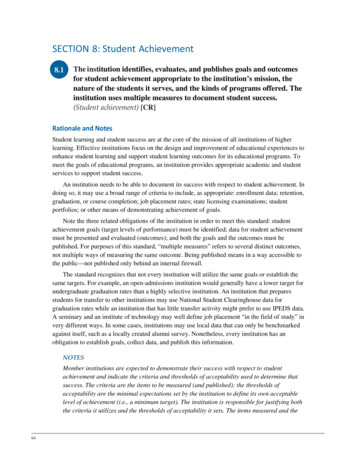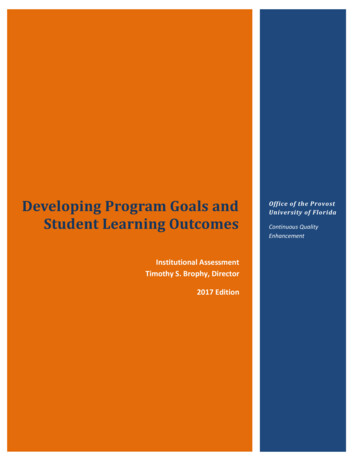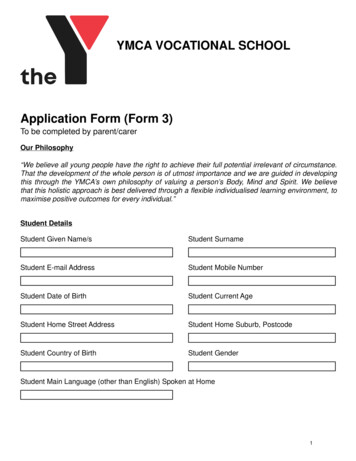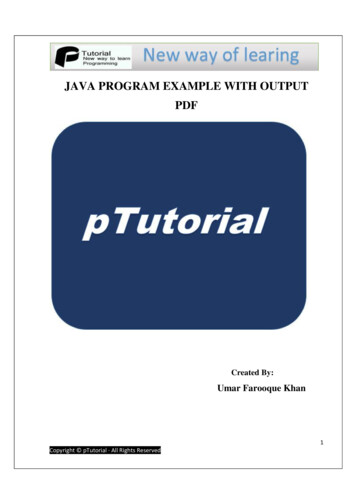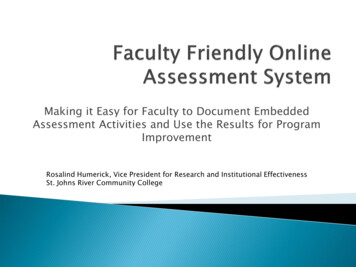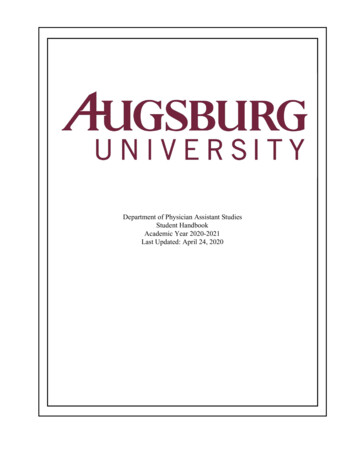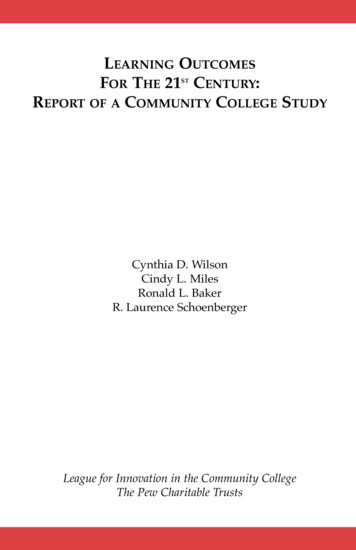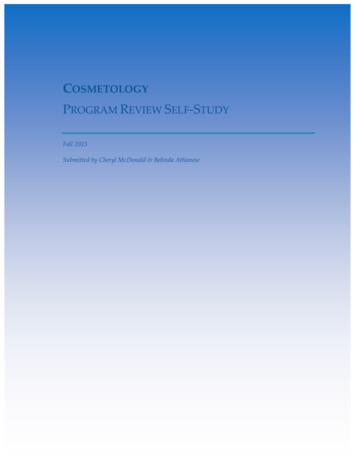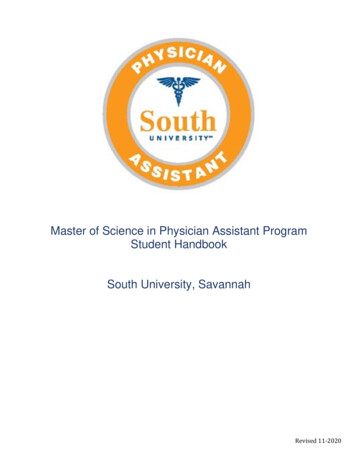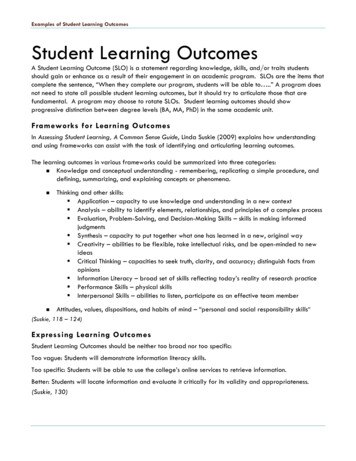
Transcription
Examples of Student Learning OutcomesStudent Learning OutcomesA Student Learning Outcome (SLO) is a statement regarding knowledge, skills, and/or traits studentsshould gain or enhance as a result of their engagement in an academic program. SLOs are the items thatcomplete the sentence, “When they complete our program, students will be able to .” A program doesnot need to state all possible student learning outcomes, but it should try to articulate those that arefundamental. A program may choose to rotate SLOs. Student learning outcomes should showprogressive distinction between degree levels (BA, MA, PhD) in the same academic unit.Frameworks for Learning OutcomesIn Assessing Student Learning, A Common Sense Guide, Linda Suskie (2009) explains how understandingand using frameworks can assist with the task of identifying and articulating learning outcomes.The learning outcomes in various frameworks could be summarized into three categories: Knowledge and conceptual understanding - remembering, replicating a simple procedure, anddefining, summarizing, and explaining concepts or phenomena. Thinking and other skills: Application – capacity to use knowledge and understanding in a new context Analysis – ability to identify elements, relationships, and principles of a complex process Evaluation, Problem-Solving, and Decision-Making Skills – skills in making informedjudgments Synthesis – capacity to put together what one has learned in a new, original way Creativity – abilities to be flexible, take intellectual risks, and be open-minded to newideas Critical Thinking – capacities to seek truth, clarity, and accuracy; distinguish facts fromopinions Information Literacy – broad set of skills reflecting today’s reality of research practice Performance Skills – physical skills Interpersonal Skills – abilities to listen, participate as an effective team member Attitudes, values, dispositions, and habits of mind – “personal and social responsibility skills”(Suskie, 118 – 124)Expressing Learning OutcomesStudent Learning Outcomes should be neither too broad nor too specific:Too vague: Students will demonstrate information literacy skills.Too specific: Students will be able to use the college’s online services to retrieve information.Better: Students will locate information and evaluate it critically for its validity and appropriateness.(Suskie, 130)
2018 Showcase2016-2017 MARRIAGE AND FAMILY THERAPYStudent Learning OutcomesSLO 1: Competence in assessment and diagnosisStudents will demonstrate competence in assessment and diagnosis of mental disorders andinterpersonal and intrapersonal issues through a variety of measures.SLO 2: Knowledge of diversity and cultural issuesStudents will increase their understanding of culture, race, ethnicity, gender, SES, sexualorientation, physical and mental abilities, religious and spiritual values, and belief systems as itimpacts working with families.SLO 3: Conceptualize and apply family therapy modelsStudents will exhibit critical thinking skills in the conceptualization and application of familytherapy models.SLO 4: Behave with Integrity and ProfessionalismStudents will behave with integrity and professionalism in their interactions with colleagues,supervisors, clients, and faculty.SLO 5: Identify and resolve ethical dilemmas related to the practice of MFTStudents will apply legal and ethical principles to clinical practice.SLO 6: Participate in professional development activities, acknowledging the value of lifelonglearningStudents will develop a professional identity by participating in professional activities andexpressing an understanding of professional organizations.Program ObjectiveO/O 6: Employment in MFT or Related FieldStudents who seek employment will be employed in MFT, or to provide related clinical services,within 90 days of graduating.
2017 Showcase2015-2016 BUSINESS ADMINISTRATION MBAStudent Learning OutcomesSLO 1: Concepts and techniques in all functional areasMBA graduates will demonstrate knowledge of business concepts and techniques in all relevantfunctional areas (e.g., managerial accounting, marketing, management, finance, and strategy).SLO 2: Leadership and Team Building SkillsMBA graduates will demonstrate skills in leadership and team building.SLO 3: Ethical and Cultural AwarenessMBA graduates will demonstrate the ability to identify and understand ethical and culturalperspectives.SLO 4: Effective communication skillsMBA graduates will demonstrate the ability to communicate effectively.SLO 5: Creative Critical Thinking SkillsMBA graduates will demonstrate creative critical thinking skills by integrating and applyingappropriate concepts, technologies and decision making techniques to effectively evaluate andmanage a business in a global environment.Program ObjectiveO/O 6: International rankings of MBA program outcomesInternational percentile rankings of MBA student knowledge at the conclusion of the MBA programwill be used as the most externally valid Student Achievement Objective for the MBA program.MBA results on the MBA ETS Major Field Exam will be compared to the external results preparedby ETS to assess program achievement over time. This comparison for each year's MBAgraduating cohort will show what our MBA students know at the conclusion of their program tomore than 25,000 MBA students world-wide who take the same standardized exam at more than260 institutions.
2015 ShowcasePUBLIC RELATIONS MSStudent Learning OutcomesSLO 1: Mass Communication and Public Relations TheoriesStudents will demonstrate knowledge in mass communication and public relations theories and the ability tointegrate these concepts, theories, and principles to public relations problems and opportunities.SLO 2: Research SkillsStudents will be able to gather and analyze information and relate conclusions to the public relations opportunityor problem at hand or apply the findings to organizational strategic planning and/or strategic communicationplanning.SLO 3: Application of Skills - Campaign/StrategiesStudents will demonstrate a thorough knowledge of mass communication and public relations theories and researchby developing a comprehensive public relations campaign or providing in-depth analysis of public relationsstrategies.SLO 4: Application of Skills - Internship/ProjectStudents will develop professional skills through major projects or supervised internships in various media settings.Student Achievement Program ObjectiveO/O 5: Program Objective OutcomeThe School of Mass Communication and Journalism will maintain an 80% graduation rate in the Public Relations MSprogram.
2014 ShowcaseCHILD AND FAMILY STUDIES BS*Student Learning Outcomes1. Students completing a B.S. degree in the Department of Child and Family Studies will demonstrate anunderstanding of basic theoretical principles and concepts related to individual, child, family andcommunity systems, through written and oral communication.2. Students completing a B.S. degree in the Department of Child and Family Studies will apply criticalthinking skills to societal problems impacting children, families and communities.3. Students completing a B.S. degree in the Department of Child and Family Studies will demonstrate values,attitudes and behaviors that reflect cultural sensitivity and social responsibility required for professionalpractice in human service and educational settings.4. Students completing a B.S. degree in the Department of Child and Family Studies will develop andimplement prevention, intervention and/or educational programs based on individual/community needsassessments.5. Students completing a B.S. degree with an emphasis in Child Development will appropriately assessdevelopmental domains (social, emotional, intellectual, and physical) of young children (PreK- K).6. Students completing a B.S. degree with an emphasis in Child Development will create and implementdevelopmentally appropriate early childhood curricula.7. Students completing a B.S. degree with an emphasis in Child Life will appropriately assess the psychosocialand developmental needs of children and families during healthcare experiences. (Child Life EmphasisHattiesburg Campus Only)8. Students completing a B.S. degree with an emphasis in Child Life will plan and implement evidence-basedchild life practices for children and families during their healthcare experiences. (Child Life EmphasisHattiesburg Campus Only)9. Students completing a B.S. degree with an emphasis in Family Relations will demonstrate professionalbehaviors necessary for success as an entry level child and family professional.10. Students completing a B.S. degree with an emphasis in Family Relations will apply knowledge and skillsnecessary for success in future graduate study or employment as an entry level child and family serviceprofessional.
O/O 6: International rankings of MBA program outcomes International percentile rankings of MBA student knowledge at the conclusion of the MBA program will be used as the most externally valid Student Achievement Objective for the MBA program. MBA results on the MBA ETS Major Field Exam will be compared to the external results prepared
